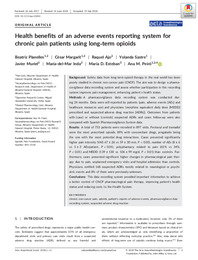Título :
Health benefits of an adverse events reporting system for chronic pain patients using long-term opioids |
Autor :
Planelles, Beatriz
Margarit, César
Ajo Ferrer, Raquel 
Sastre, Yolanda
Muriel, Javier 
Inda, María del Mar
Esteban, María D.
Peiró, Ana  |
Editor :
Wiley Online Library |
Departamento:
Departamentos de la UMH::Farmacología, Pediatría y Química Orgánica |
Fecha de publicación:
2019-02 |
URI :
https://hdl.handle.net/11000/32362 |
Resumen :
Background: Safety data from long-term opioid therapy in the real world has been poorly studied in chronic non-cancer pain (CNCP). The aim was to design a pharmacovigilance data recording system and assess whether participation in this recording system improves pain management, enhancing patient's health status.
Methods: A pharmacovigilance data recording system was conducted during 24 months. Data were self-reported by patients (pain, adverse events [AEs] and healthcare resources use) and physicians (morphine equivalent daily dose [MEDD] prescribed and suspected adverse drug reaction [ADRs]). Outcomes from patients with (case) or without (controls) suspected ADRs and cases follow-up were also compared with Spanish Pharmacovigilance System data.
Results: A total of 753 patients were recruited in 897 visits. Fentanyl and tramadol were the most prescribed opioids, 89% with concomitant drugs, pregabalin being the one with the most potential drug interactions. Cases presented significantly higher pain intensity (VAS 67 ± 26 vs 59 ± 30 mm, P < 0.05), number of AEs (8 ± 6 vs 5 ± 3 AEs/patient, P < 0.01), polypharmacy related to pain (65% vs 34%, P < 0.01) and MEDD (139 ± 130 vs 106 ± 99 mg/d, P < 0.01) than controls. Furthermore, cases presented significant higher changes in pharmacological pain therapy due to pain, unplanned emergency visits and hospital admission than controls. Physicians notified 168 suspected ADRs mostly related to neurological or psychiatric events and 8% of them were previously unknown.
Conclusions: This data recording system provided important information to achieve a better control of CNCP pharmacological pain therapy, improving patient's health status and reducing costs to the Health System.
|
Palabras clave/Materias:
chronic non-cancer pain
opioids
patient's reports of adverse events
pharmacovigilance data recording system
suspected adverse drug reaction |
Área de conocimiento :
CDU: Ciencias aplicadas: Medicina: Farmacología. Terapéutica. Toxicología. Radiología |
Tipo de documento :
info:eu-repo/semantics/article |
Derechos de acceso:
info:eu-repo/semantics/openAccess |
DOI :
https://doi.org/10.1111/aas.13243 |
Publicado en:
Acta Anaesthesiologica Scandinavica. 2019 Feb;63(2):248-258 |
Aparece en las colecciones:
Artículos - Farmacología, Pediatría y Química Orgánica
|
 La licencia se describe como: Atribución-NonComercial-NoDerivada 4.0 Internacional.
La licencia se describe como: Atribución-NonComercial-NoDerivada 4.0 Internacional.
.png)
